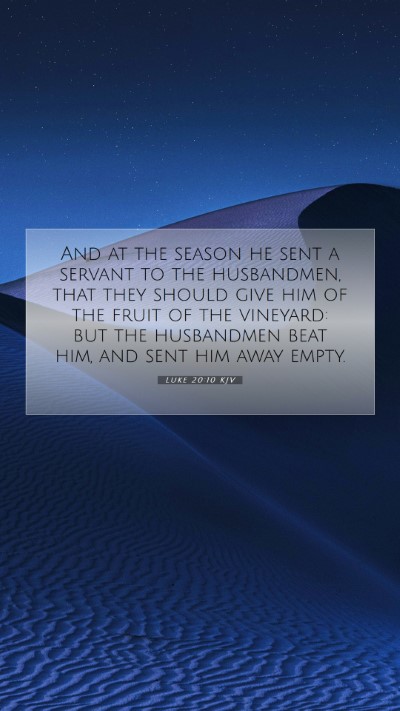Understanding Luke 20:10 - A Comprehensive Bible Verse Commentary
Luke 20:10 reads: "At the season he sent a servant to the husbandmen, that they should give him of the fruit of the vineyard: but the husbandmen beat him, and sent him away empty." This verse is rich in meaning and invites several layers of interpretation. Below, we will explore the verse using insights from public domain commentaries to enhance your Bible verse understanding.
Contextual Background
This verse is part of a parable told by Jesus, often referred to as the Parable of the Wicked Tenants. Understanding the cultural and historical context is crucial for an informed Bible verse interpretation. Jesus was addressing the religious leaders of His time, illustrating the relationship between God and His people through the metaphor of a vineyard.
Summary of Insights from Commentaries
-
Matthew Henry’s Commentary
Matthew Henry emphasizes that this parable depicts God’s relationship with Israel. The vineyard represents Israel itself, and the husbandmen symbolize the Jewish religious leaders. Henry points out that the servant sent by the owner signifies the prophets, who were often mistreated by the people they were sent to serve.
-
Albert Barnes’ Notes
Albert Barnes elaborates on the idea of stewardship and accountability. He explains that the vineyard owner expects a return on his investment in the vineyard, akin to God's expectations from His people. Barnes further interprets the beating of the servant as a foreshadowing of the rejection and persecution of God’s prophets throughout history.
-
Adam Clarke’s Commentary
Adam Clarke delves into the symbolism present in the parable. He notes that the fruit represents the spiritual fruit God desires from His people. Clarke stresses that the actions of the husbandmen reflect the ingratitude and rebellion of those in power against God’s authority, leading to grave consequences.
Theological Implications
From the combined insights of these commentaries, we can draw several theological implications:
- God’s Expectations: The vineyard signifies not just Israel, but the expectation that all God’s followers produce good fruit—acts of righteousness and faithfulness.
- Rejection of Prophets: The treatment of the servant reflects a historical pattern in which God’s messengers are rejected, a theme prevalent throughout Scripture.
- Divine Justice: This parable serves as a forewarning of divine judgment for those who fail to acknowledge and respect God’s authority.
Applications for Today
Understanding this passage can lead to profound Bible study insights applicable in today’s world:
- Self-Examination: Believers are called to consider how they respond to God’s word and His servants. Are we being fruitful in our spiritual lives?
- Recognizing God's Authority: Just as the husbandmen misused their role, we must not lose sight of our responsibilities as stewards of the gifts God has entrusted to us.
- Encouraging Respect for Prophetic Voices: In our churches and communities, we must honor those who speak truth, understanding the potential consequences of rejecting God’s messengers.
Related Bible Verses
To enrich your Bible verse analysis, consider the following related Scriptures:
- Isaiah 5:1-7 - The Song of the Vineyard
- Matthew 21:33-46 - The parallel account of the Wicked Tenants
- Romans 11:17-22 - Gentiles and the olive tree metaphor
Conclusion
In summary, Luke 20:10 serves as a poignant reminder of God’s expectations from His people and the consequences of failing to heed His call. This parable not only speaks to the specific context of Jesus’ audience but also possesses timeless relevance for all believers. As you engage deeper with this passage, let it shape your understanding and application of Scripture in our lives today. For those seeking bible verse explanations, this parable illustrates the profound significance of our responses to God’s messages.


